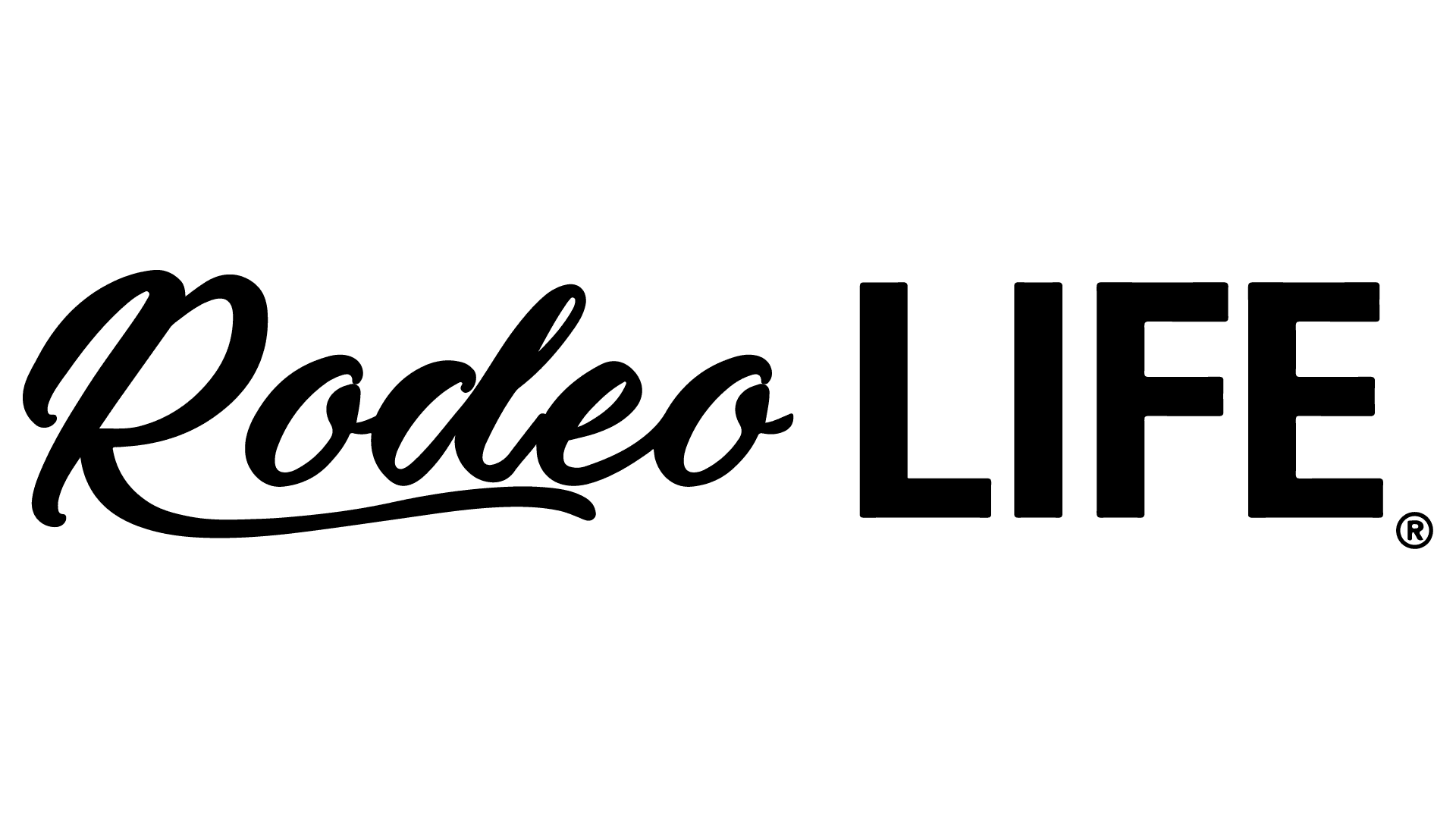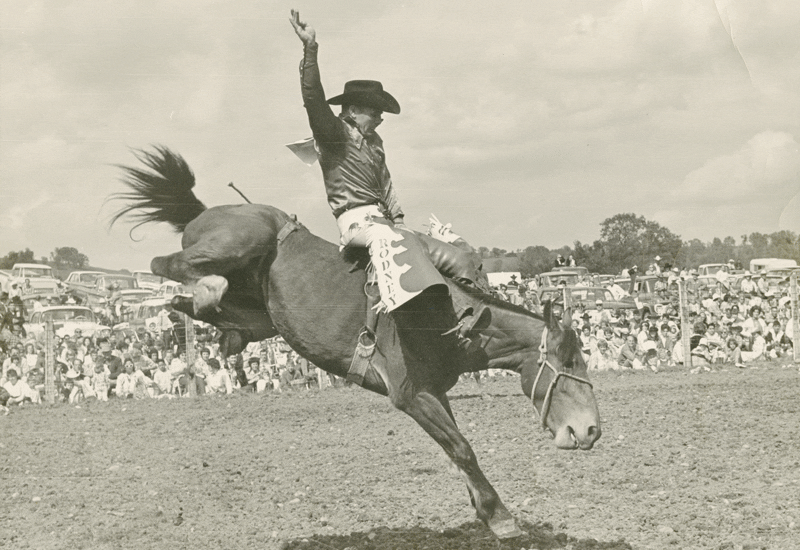Rodney Towe held down a fulltime job while he rodeoed, with a rodeo career that spanned fifty years.
The Hilmar, California cowboy worked for 36 years at the Turlock Irrigation District, while he rodeoed, hitting sometimes as many as 60 rodeos annually.
Born in 1941 in Fillmore, Calif. to William and Minnie Towe, he grew up on the Rancho Sespe. His dad was an irrigator for the citrus orchards that dotted the ranch.
As a child, he loved the gymkhanas that took place. “I was a gymkhana nut,” he said.” He rode a grade mare, purchased for $150.
The family moved to Oxnard, California, where they built an arena on their two acres. They formed a riding club, the Rio Riders. As a teen, his mother pulled the trailer to Turlock, where he competed at the California State Horsemen’s Association Gymkhana and won the state championship in the ring spearing once and was two times a runner-up behind his uncle Frank Cox.
But he wanted to do more than gymkhanas. His cousin Gordon Cox, two years his senior, wanted to be a bull rider. So in 1955, Gordon entered himself and Rodney in the steer riding at the Monterey County Sheriff’s Rodeo in Salinas. The boys drove six hours from home to ride; out of 75 riders, Rodney won it.
“Gordon hated me all the way home,” he chuckled. “He was supposed to be the bull rider.” For first place, Rodney won a pair of black and white Acme boots with black wingtips.
“That was the start,” he said, of a rodeo career that would take him across the nation.
At age seventeen, he started riding bareback horses at amateur rodeos. A strong upper body, in part due to tumbling and gymnastics, helped him succeed, along with a natural athleticism.
After high school graduation in 1958, Rodney went to work in a variety of places. He did construction, drove a forklift, installed ceilings, whatever he could find.
And he continued to rodeo, competing at the Western Approved Rodeos (WAR), the California fair rodeos. The family moved to northern California in 1961, where he cowboyed for $10 a day, worked for the turkey plant in Turlock, and rode bareback horses.
He began team roping, too, at jackpots and area arenas.
But it was the bulldogging that intrigued him. “I kept watching it, and it looked like a lot of fun,” he said. One day, Frank Costa asked him if he’d like to do it, and offered his old baldy mare to him to try. Rodney was nervous. Riding bareback horses “wasn’t no big deal,” but jumping onto a steer was. Three times, he ran by the steer, and “I couldn’t get off.”
John Wheatley, Sr. was hazing for him, and on Rodney’s fourth try, “I made up my mind, I’m going to jump this steer,” he said. “I jumped plum over the steer and under the hazing horse, who rattled me like a tin can down the arena. I landed on my feet, so I could catch the mare and do it again.”
His new career began. It was 1963, and two years later, he was done riding bareback horses. “The steer wrestling fit me better, and wasn’t near as hard on my body.”
In 1964, he won second for the year-end steer wrestling title at the WAR rodeos, behind John Wheatley, Jr. In 1967-68, he won the year-end.
Rodney practiced with and competed against all of the California cowboys of the day: Jack Roddy, Harley May, Bob Marshall, Tommy and Larry Ferguson and Jim Warren.
In the early 1960s he got his Rodeo Cowboys Association permit. For the next two decades, he competed not only in California and the Northwest, but across the nation: Cheyenne, Tucson, Phoenix, Yuma, Dickinson, N.D.; Red Lodge, Livingston, Calgary, and more.
He had several good horses throughout the years.
One of the first ones was a barrel-turned bulldogging horse named Dexter. Another was a horse named Woodstock who “ran like a locomotive, and scored like a champ”.
Another mare he got was Duster, a bay mare who was broke by Rodney’s father-in-law and was “so simple and easy to ride, with a super-soft mouth. She’d let you catch every steer.” Duster had a filly colt, Twinkle Star Bars, who was broke and trained by Rod’s father-in-law and who Rod used as a hazing horse.
One of the best horse stories Rod has goes to one of his later steer wrestling horses, Mama. In 1971, he flew to Springdale, Ark., to bulldog. He needed a mount, so Jim Poteet asked Bob Littrell who owned Mama, if Rod could ride her. “Damn, Jim, you know I got everybody” mounted on her,” Bob said, which included 18 bulldoggers. But he relented and let Rodney ride her. Rod won second in the first round and second in the average, behind Roy Duvall.
He rode Mama at Cheyenne, winning third on her. So he asked Bob if he would sell her. “These Okies would kill me if I sold the mare,” he told Rod, knowing the Oklahoma steer wrestlers mounted out on her.
In 1972, Littrell had a career-ending broken leg. The next February, as Rod sat at a restaurant, eating breakfast with Jim Warren, Barry Burk came in and told him, if he still wanted to buy Mama, Littrell was willing to sell.
Rodney and Jim looked at each other, “we ran to the phone, and bought her,” Rod said. They paid $4,000 for her, “which was a lot of money,” and brought her to California. “We rode her everywhere.” Bob Marshall was a part-owner of Mama, on whom he won the 1973 world title.
Rod met his wife of 50 years, Deb, when she came to California with a friend who was dating Jim Warren at the time. Deb grew up on an Arizona ranch, roping and riding, so she was familiar with horses and rodeo.
The couple has four children: sons Odle and Traxel, and daughters Zantha and Abbra.
The kids went with them when Rodney rodeoed, traveling in their 24-foot motorhome.
In the early 2000s, Rodney became a committeeman for the Salinas Rodeo. He had won the steer wrestling there in 1980 with a buckle, and eight years ago, the committee honored him as “committeeman of the year,” with another buckle. His job is to take care of the roping box.
In 2012, he jumped his last steer, at the age of 71. He attributes his longevity to the fact that he stayed healthy, and “I was just loving what I was doing, and having fun.”
Juggling work and rodeo wasn’t easy. He worked 40 hours a week, which included evenings so he could leave early on Fridays to make a rodeo. And he had to shift his focus from work to rodeo and back again, where the fulltime competitors only had to think about rodeo.
“The other guys I was competing against were rodeoing for a living, and that was all they were thinking about. They’d get someplace and have time to practice. It made it tough. It was very hard, and it kept me from wining a lot of money.” Even with part-time rodeo, he came within $10,000 of making the National Finals Rodeo in 1980.
But the job was a necessity. “I had a job, with insurance, to take care of my family. That was important, taking care of my family.”
He was still bulldogging until ten years ago.
“It was fun for me. I saw so many guys with more talent than I had, that quit. It wasn’t fun for them, it was just a job. I never could understand that.”
His family was behind him, all the way. “I had the full support of my wife and kids, or none of this would have happened,” he said.
He and Debbie say the best part of rodeo is the people, “the people you meet and get acquainted with, from all parts of the country. You can reconnect with them ten or thirty years later, and it’s just like it was yesterday.”
He looks back fondly on his rodeo days.
“We had quite a time.”
Back When They Bucked with Rodney Towe
70
previous post









